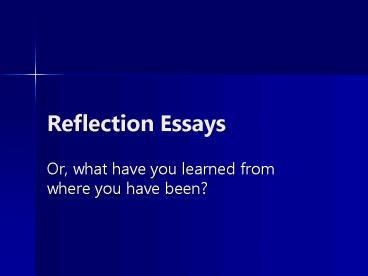Reflection Essays - PowerPoint PPT Presentation
Title:
Reflection Essays
Description:
Reflection Essays Or, what have you learned from where you have been? Writing I believe in miracles in every area of life except writing. Experience has shown ... – PowerPoint PPT presentation
Number of Views:82
Avg rating:3.0/5.0
Title: Reflection Essays
1
Reflection Essays
- Or, what have you learned from where you have
been?
2
Writing
- I believe in miracles in every area of life
except writing. Experience has shown me that
there are no miracles in writing the only thing
that produces good writing is hard work. - Isaac Bashevis Singer
3
What are Reflection Essays about?
- Reflection essays are based on personal
experience. - Writers of reflection have modest goals. They do
not set themselves up as experts. They simply
try out their ideas.
4
Do I need sources?
- Reflective writers present something they did,
saw, overheard, or read.
5
How do I write?
- They attempt to make their writing vivid so that
the reader can imagine what they experience.
6
Why should I write?
- The writers goal is to present the experience in
order to explore its possible meanings. - To use events in their lives and people and
places they have observed as the occasions or
springboards for thinking about societyhow
people live and what people believe.
7
What is reflective writing?
- Reflective writing is explorative, lively and
creative. - It often surprises the reader with its insights
and unlikely connections. - Reflective writing encourages the reader to look
in new ways at familiar things, examining with a
critical eye what they usually take for granted.
8
How do I start?
- Begin by thinking about what your experiences
have taught you about yourself, your world,
society in general, etc. Look for those aha! - moments that crystallized in your memory.
9
Reflective Writers
- Present a particular occasion in a vivid and
suggestive way that encourages readers to want to
know more about the writers thoughts. - Use your own voice
10
Developing Your Reflections Giving Examples
- Illustrate your ideas with specific examples.
- Ask yourself What examples would be best to
help the reader understand your ideas?
11
Developing Your Ideas Comparing and Contrasting
- Think of a subject that could be compared with
yours, and explore the similarities and
differences.
12
Developing Your Reflections Extending
- Take your subject to its logical limits, and
speculate about its implications. - Where does it lead?
13
Developing Your Reflections Analyzing
- Take apart your subject.
- What is it made of? How are the parts related to
one another? Are they all of equal importance?
14
Developing Your Reflections Applying
- Think about your subject in practical terms.
- How can you use it or act on it? What difference
would it make to you and to others?
15
Keep your Purpose in mind
- Consider this question
- What do I want my readers to think about the
subject after reading my essay?
16
Maintaining Topical Coherence
- The writer turns the subject this way and that,
looking first from one perspective and then from
anotherpiling up examples to illustrate their
ideas.
17
A Mind at Work
- The writer arranges the parts carefully to give
the appearance of the writers mind at work.
18
Repeat Key Words or Phrases First Method
- Each new idea or example may seem to turn the
essay in an unexpected new direction, making the
essay seem to ramble. However, referring to the
subject at various points of the essay by
repeating certain key words or phrases associated
with the subject pulls the reader back to the
topic.
19
Carefully Placed Transitions Method Two
- Time and place markers within the essay to
introduce a series of examples will also help
achieve topical coherence.
20
Engaging Readers
- Remember, readers have no pressing reason to read
a reflective essay. - The writers goal is to create common ground with
the readersomething must catch the readers
eyea hook.
21
A Few Examples of Hooks for Reflection Essays
- A familiar authors name
- An Intriguing title
- A unique quote
- An intriguing question
- Humor
22
How to Keep the Reader Reading
- The writer needs to project an image of
themselvessometimes called the writers persona
or voicethat readers can identify with or at
least find interesting.
23
Proofreading
- Remember, proofreading the final copy for
spelling, grammatical errors and sentence
formation makes all the difference in the world
if the writers goal is to present their writing
as something they care about. - If the writer doesnt care, why would the reader?
24
And FinallyAn Appropriate Quote
- I see but one rule to be clear.
- Stendhal

























![[DOWNLOAD]⚡️PDF✔️ What Should I Believe?: Philosophical Essays for Critical Thinking PowerPoint PPT Presentation](https://s3.amazonaws.com/images.powershow.com/10046745.th0.jpg?_=20240603068)
![Download Book [PDF] Montaigne: Essays PowerPoint PPT Presentation](https://s3.amazonaws.com/images.powershow.com/10050525.th0.jpg?_=202406071210)




